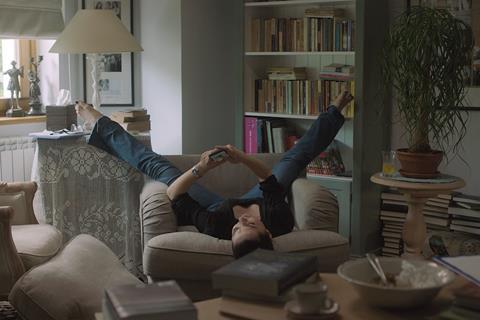Cristi Puiu’s four-chapter plunge into Romania’s year of Covid-19 is ‘a heavyweight head-scratcher’

Dir. Cristi Puiu. Romania/France/Moldova. 2023. 160 mins.
The term immersive cinema usually signals something effects-laden and spectacular that offers an intellectually undemanding escapist ride. By contrast, Cristi Puiu’s MMXX is immersive in an entirely different way: it plunges us directly into the lives of its characters, refusing convenient signposts and leaving us to navigate for ourselves the maze of its often elusive meaning. The sixth feature by the director whose 2005 film The Death of Mr Lazarescu is often credited with launching the Romanian New Wave, MMXX - premiering in competition in San Sebastian - is a heavyweight head-scratcher that’s likely to prove more appealing to students of formal challenge than it is to averagely discerning art-house adepts. You have to admire Puiu for doing things entirely on his own terms: the hard part is defining quite what those terms are.
An alienating watch
One uncertainty is whether this is a set of four entirely separate narratives, or whether an overall design properly knits together these fragments with their recurring characters. Puiu’s press notes, however, specify that the episodes represent “a possible diary of the year 2020”, and that the narratives emerged from actors’ workshops in which participants described episodes they had witnessed.
Each section is preceded by an image of detritus-strewn wasteground, and a chapter heading. The first, ‘Semper Libra’ (‘always free’), begins with a blast of Verdi and the comical image of a woman in an armchair adopting an upside-down yoga position. She is therapist Oana (Bianca Cuculici), who subsequently receives a patient - a middle-aged woman named Ioana (Otilia Panaite) who arrives with flowers. Their session begins once Oana has finished fussing over the qualities of Bic pens, with which Ioana is to fill out a questionnaire. As they go through the questions – briefly interrupted by the intrusion of Oana’s brother Mihai (Laurențiu Bondarenco) - Ioana’s aggressively narcissistic self-confidence appears so ironclad that you wonder why she’s seeking therapy in the first place.
After this episode, ‘Baba Au Rhum’ finds Oana and Mihai in her cluttered kitchen. He’s panicking about a kitchen implement he needs to prepare the titular dessert, she’s on the phone to a man named Bobo, and her husband Septimiu (Florin Tibre) is in another room, blithely unconcerned about their worries. Bobo’s wife Sabina has just given birth, but the baby has been removed for safety reasons and they therefore need a lawyer: the background to all these stories, partly providing explanatory context is, as the film’s overall title suggests, the COVID crisis of 2020.
Septimiu, a hospital orderly, reappears in ‘Norma Jeane Mortenson’, half-heartedly listening to the rambling narrative from a colleague who once slept with a gangster’s Marilyn-esque girlfriend. Then comes the most perplexing chapter – seemingly unrelated to the rest, barring a brief garrulous reappearance of Oana’s patient, and named ‘The Eighth of July’ (this title unhelpfully provided in Russian, for no obvious reason). A man who turns out to be a police inspector drives through the countryside to the funeral of a man who has killed himself. The dead man’s widow, a sex worker known as Consuelo, relates an utterly harrowing tale about organ trading and child prostitution. This is the point where MMXX finally reaches a point of dramatic concentration, not least because of a magnetically unsettling performance by Adelaida Perjoiu.
At 160 minutes, the film is a typical example of Puiu’s durational approach (only his first film, 2010’s Stuff and Dough, clocks in under 150). Long takes prevail, with shifts of style between episodes: for example, the first chapter is a single unbroken half-hour take, while the second, lasting an hour, simulates real time, with a restless camera and ample cuts. While the visual content is extremely simple – for the first three episodes, just people in rooms – the spoken information (character and place names, among other supporting details) is bewilderingly dense. Background sound – ringing phones, music and TV noise, distant thunder – adds to the sense of overload.
The registers are different too, with a manifest progression - from the brittle bourgeois comedy of the start, through a gradual revelation of the traumas of Covid-19 and the undersides of modern Eastern European life, through to the final intimation of a modern hell on earth. The acting throughout is in turns so vivid and so briskly casual that we seem to be simply eavesdropping on real people. MMXX might be read as a time-slice of the human condition as experienced in Romania in one particular year. But the overall effect is to make us feel not merely immersed but positively trapped in the labyrinth of these lives, the feeling of claustrophobia – evoked notably in section two by Ivan Grinchenko’s restless camera – echoing Puiu’s more immediately engaging 2016 Sieranevada, with its crowded apartment setting.
MMXX may not be Puiu’s most difficult film – that would be his 2020 costume drama Malmkrog, a cerebral disquisition on 19th-century Russian political philosophy. By contrast, MMXX – until it gestures at the moral abyss in the final section – seems concerned with incidents and anecdotes that often feel all but inconsequential. No doubt this too is the stuff of the human condition, but Puiu’s depiction of it all makes for an alienating watch, and on emerging from his maze, it’s hard to know exactly where you’ve been, or why Puiu has chosen to take you there.
Production companies: Mandragora, Block Media Management
International sales: Shellac, egle.cepaite@shellacfilms.com
Producers: Dorian Boguță, Dragoș Bucur, Cristi Puiu, Anca Puiu
Screenplay: Cristi Puiu
Cinematography: Ivan Grinchenko
Editing: Sebastian Pereanu, Ecaterina Iaschevici
Main cast: Bianca Cuculici, Laurențiu Bondarenco, Otilia Panaite, Florin Țibre
























